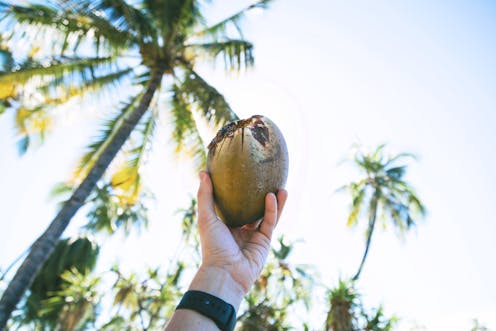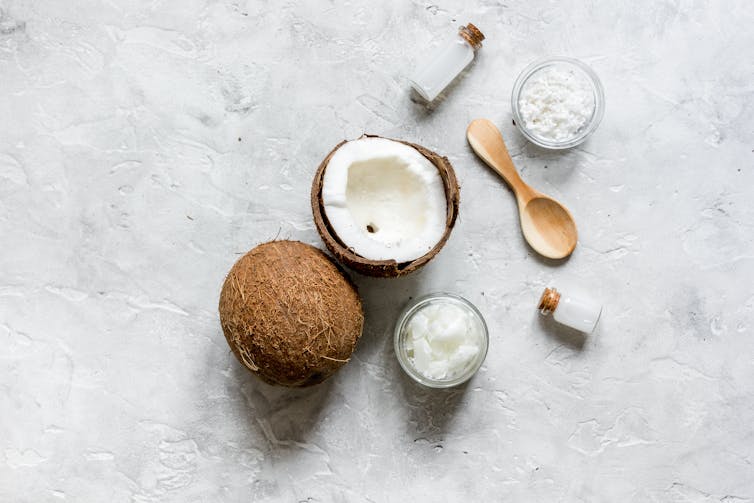Five claims about coconut oil debunked
- Written by Rosemary Stanton, Nutritionist & Visiting Fellow, UNSW
 Is coconut oil all it's really cracked up to be, or is it just another fad?Sebastien Gabriel/Unsplash, CC BY
Is coconut oil all it's really cracked up to be, or is it just another fad?Sebastien Gabriel/Unsplash, CC BYCoconuts have been a valued food in tropical areas for thousands of years, traditionally enjoyed as coconut water from the centre of the coconut, coconut flesh, or coconut “milk” (made by steeping the flesh in hot water).
Solid white coconut oil (I’ll use this popular term, although technically it’s a fat not an oil) is now the darling of celebrities and bloggers, paleo enthusiasts and sellers of so-called superfoods. Claims for its supposed medical value reverberate around the internet, but how well do they stand up to scientific scrutiny?
1. It helps you lose weight
No study has found coconut oil helps weight loss. The claim made on hundreds of internet sites that it has some special ability to get rid of body fat is based on the erroneous idea that coconut oil is synonymous with a semi-synthetic laboratory product known as MCT oil.
Read more: Health Check: are saturated fats good or bad?
 Claims that coconut oil can get rid of body fat are based on false premises.From www.shutterstock.com
Claims that coconut oil can get rid of body fat are based on false premises.From www.shutterstock.comUnlike regular edible oils, MCT oil is soluble in water and was originally designed for use in tube feeding or for people who were malnourished because they lacked normal enzymes that split fat. Unlike most fats that are absorbed into the bloodstream, MCT oil is absorbed directly into the liver. This means it can be used more rapidly for fuel than other fats.
There is some evidence MCT oil may help with weight loss, although the dose required and its side effects – at least initially – can include nausea, stomach cramps and diarrhoea. Even so, internet sites that assume the effects of MCT oil also apply to coconut oil are wrong. The two products are not equivalent and you can’t switch the findings of one to the other.
MCT is made up of two fatty acids - caprylic and capric acids. Coconut oil has small amounts of these acids, but its dominant fatty acid is lauric acid. Lauric acid is not digested in the liver but is digested and metabolised in the body like the fatty acids in other edible oils.
If munching on a piece of coconut flesh (which is a reasonable source of dietary fibre) helps you eat less overall, that could be useful. However, a study of different fats, including coconut oil, found no beneficial effect on hunger, fullness, satisfaction or current thoughts of food.
2. It reduces heart disease risk
Careful studies show the overall effect of coconut oil on increasing LDL cholesterol (which increases the risk of heart disease) is greater than with corn, safflower or a mixture of soybean and sesame oils. It is, however, slightly better than butter.
Read more: Health Check: what’s healthier, butter or margarine?
Plenty of evidence from studies of people living traditional lifestyles with coconut (as flesh or the creamy liquid squeezed from the flesh) as their major source of fat show low levels of heart disease. They include 1960s studies of lean and active Pacific Islanders whose diets consisted mainly of fish, octopus, taro, breadfruit, bananas and coconuts.
 Pacific Islanders use coconut as a major source of fat.Eddie Kopp/Unsplash, CC BY
Pacific Islanders use coconut as a major source of fat.Eddie Kopp/Unsplash, CC BYThe same applies to the very lean people of Kitava (a small island of Papua New Guinea), with their traditional diet of yams, cassava, sweet potato, taro, banana and other tropical fruits, fish and coconut. Their diet is not only low in fat, but also has little alcohol, salt, sugar, dairy or processed foods.
In contrast to these restricted diets of past times, coconut has not been able to protect against big changes in diet and activity. In Samoa, for example, coconut consumption hasn’t changed, but the total daily diet contributed 3,800 kilojoules (900 calories) more in 2007 compared with the 1960s. Pacific Islanders now top the world obesity tables, heart disease rates are high, and type 2 diabetes is three times more common than in Australia - all in spite of consuming coconut.
Read more: Got high cholesterol? Here are five foods to eat and avoid
As one recent review of 21 research papers and a further review have shown, coconut oil cannot be relied on to reduce blood cholesterol or protect against heart disease.
3. It kills bacteria and viruses
Some internet sites claim coconut oil can kill viruses, fungi and bacteria due to its content of monolaurin, a compound derived from lauric acid.
Studies in mice show monolaurin can provide some protection against the bacteria Staphylococcus aureus (responsible for some staph infections), but researchers doing this study found no effect with either refined or virgin coconut oil.
In particular types of infection, there is some possibility monolaurin might be of use, but it’s not valid to extrapolate from this to make claims about coconut oil when there’s no evidence the body can make monolaurin from coconut oil.
Instead, a manufactured form of monolaurin (glycerol monolaurate) is found in coconut oil and is popular for its emulsifying and moisturising properties in cosmetics, detergents and soaps. These properties in coconut oil could support its benefits as a surface moisturiser or make-up remover.
4. It repairs your hair
Several papers published in the Journal of Cosmetic Science claim that coconut oil applied to hair is better at penetrating the hair shaft than mineral oil.
This could be useful and it’s unlikely that coconut oil massaged into hair will have any adverse effect on human health, so if it appeals, it may be worthwhile to use it for this reason.
 There are claims coconut oil will repair damaged hair.From shutterstock.com
There are claims coconut oil will repair damaged hair.From shutterstock.com5. It whitens your teeth
This claim is another extrapolation of the idea that coconut oil can kill harmful organisms. The practice of swishing oil in the mouth (called “oil pulling”) for 10-30 minutes before spitting hails from Ayurvedic practices in India and supposedly draws out toxins.
If it makes you feel sick or headachy, that’s meant to be proof you are extracting toxins.
There’s no scientific evidence to support this practice and it should not replace proper dental care.
Rosemary Stanton does not work for, consult, own shares in or receive funding from any company or organisation that would benefit from this article, and has disclosed no relevant affiliations beyond their academic appointment.
Authors: Rosemary Stanton, Nutritionist & Visiting Fellow, UNSW
Read more http://theconversation.com/five-claims-about-coconut-oil-debunked-85320





